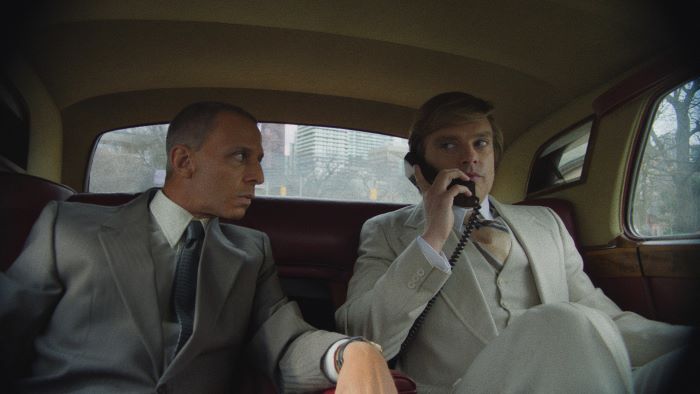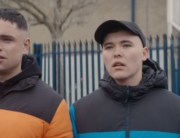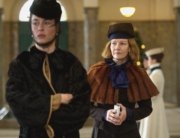
Jeremy Strong, left, and Sebastian Stan in The Apprentice (Pief Weyman/Briarcliff Entertainment/Rich Spirit)
In the latest indictment against former President Donald J. Trump by special counsel Jack Smith, one sentence stands out. The focus of Smith’s investigation centers on Trump’s role in the January 6th insurrection, and according to the report, Trump told family members on the day in question that, “It doesn’t matter if you won or lost the election. You still have to fight like hell.” This reaction could have been lifted from screenwriter Gabriel Sherman’s The Apprentice, which traces Trump’s rise as an ambitious real estate mogul in the 1970s and ’80s under the tutelage of the bombastic lawyer Roy Cohn, famous for persecuting Julius and Ethel Rosenberg and for his role in the McCarthy hearings.
In the early ’70s, Trump (Sebastian Stan) turns to Cohn (a tightly wound, reptilian Jeremy Strong) to represent the Trump family real estate business in a federal lawsuit charging the company with discrimination in housing. Through Cohn, Trump gains entrée into Manhattan’s elite. Under his tutelage, Trump learns three rules: One is to attack one’s enemies; second, admit nothing; and never declare defeat, but claim victory instead. Sherman and director Ali Abbasi (Holy Spider) have studied how Trump’s actions from decades ago echo now as he runs for his second term.
Still in his twenties, Trump is determined to become more successful than his domineering father, Fred Trump Sr. (Martin Donovan). It could be argued that the paterfamilias is the true villain. The senior Trump presides over a family dinner as if it were a board meeting, taking every opportunity to belittle his eldest son, airline pilot Freddy (Charlie Carrick), who, in his eyes, is a walking, breathing failure. Freddy appears infrequently on screen, usually when he’s on a bender. (His daughter, Mary L. Trump, wrote the 2020 family tell-all Too Much and Never Enough: How My Family Created the World’s Most Dangerous Man.)
The overall result is the opposite of a hagiography. The filmmakers often don’t give the on-screen Trump much benefit of the doubt, especially in their depiction of his marriage to his first wife, Czechoslovakian-born model Ivana (Maria Bakalova, not quite statuesque). This includes a scene that instantly gained notoriety when The Apprentice premiered at Cannes, in which Trump rapes Ivana. In her 1990 sworn divorce deposition, Ivana stated that her husband had raped her. She later walked back that accusation, saying she didn’t mean it “in a literal or criminal sense.” In 2015, she added that the veracity of a sexual assault had “no merit.” The allegation was first published in Harry Hurt III’s 1992 unauthorized Lost Tycoon: The Many Lives of Donald J. Trump, which also claimed Trump underwent surgery to remove a bald spot, a detail graphically depicted by Abbasi.
Yet neither is this biopic a screed. At least in the beginning, the filmmakers present Trump with softer edges, portraying him as a newbie from Queens, awestruck by the cliquish Manhattan glitterati. (It was filmed in Toronto, and the grit, chaos, and hustle and bustle of the Big Apple are noticeably missing. The disco-laden soundtrack, however, captures the time period perfectly.) Stan embodies his subject’s speech pattern and walk—even the pout—all without resorting to mimicry. Perhaps the biggest surprise here is that Trump can be soft-spoken and subtle at times. So, if you want Trump the buffoon, look to the late-night talk shows.
But who is the audience for a film about the most ubiquitous U.S. politician of the last decade? Maybe readers of books that have covered the same era, such as Maggie Haberman’s Confidence Man: The Making of Donald Trump and the Breaking of America (2022) or Andrea Bernstein’s American Oligarchs: The Kushners, The Trumps, and the Marriage of Money and Power (2020). Though it’s doubtful they would find it revelatory. There’s also no incentive for either Trump supporters or detractors. Anyone who has been awake since 2015 will be familiar with most of his dramatized actions.
However, as a movie, the energy sputters along as the timeline stops for obligatory milestones in Trump’s biography: his pet project of turning a blighted hotel into a Hyatt, the building of Trump Tower, his Atlantic City ventures, and his extramarital activities. Although his first marriage crumbles before the viewers’ eyes, the storyline ends before their explosive, gossipy 1990 divorce—a gift for the tabloids—and instead concludes on a less dramatic, more muted note.
But why a feature film? If one has a craving for a closer examination of either Cohn or Trump, one is better off with Matt Tyrnauer’s compelling documentary Where’s My Roy Cohn (2019) or even going back to Anthony Baxter’s You’ve Been Trumped (2011), where the real estate developer is the Goliath to a small Scottish community’s David. Both films expose more.






Leave A Comment